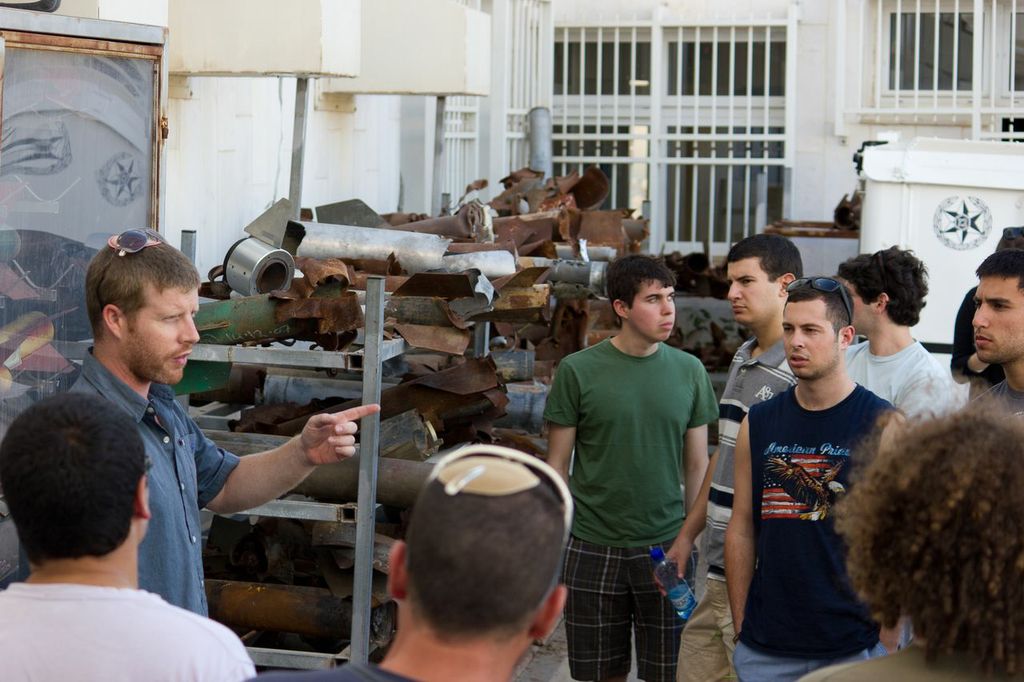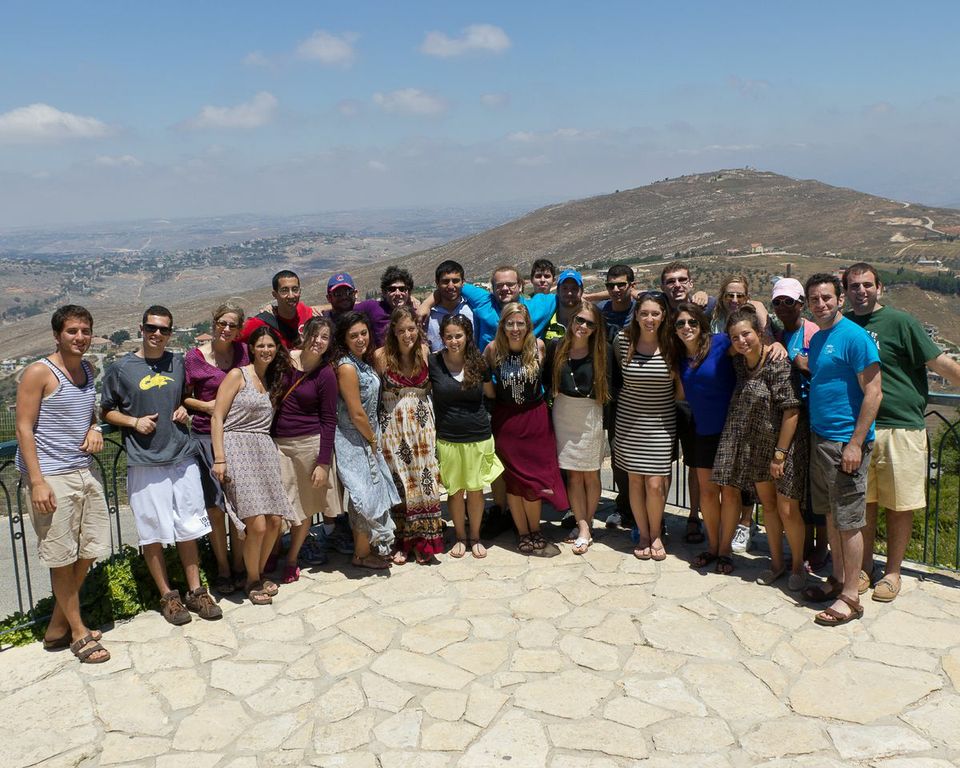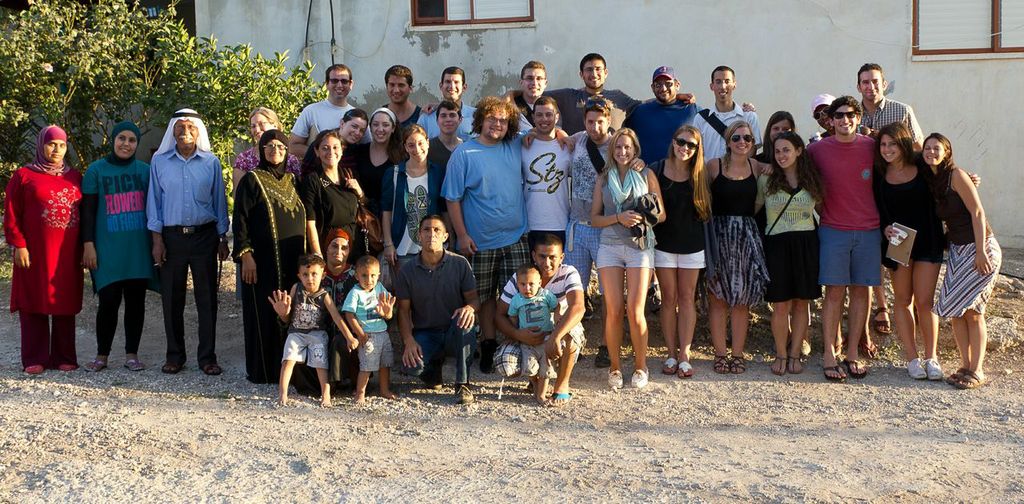The room was so tense; one could hear the heartbeats of their colleagues as they desperately hoped that their cell phones would remain silent. As the man with the distinguished British accent walked to the front of the room, we could all sense that greatness was in our midst. Sgt. Benjamin Anthony started his speech first by looking us all squarely in the eye and informing us unequivocally that we could be anything we wished in this world, so long as we believed it, and pursued it. And unlike those cliche memes one finds on Facebook, we all, in that one moment, believed him because of the fire in his eyes and the passion in his voice.
The CAMERA 2013 Leadership and Advocacy Training Mission to Israel was filled with inspiring moments like these. CAMERA’s Campus Director, Aviva Slomich, and Senior Research Analyst, Gilead Ini, took twenty-three of the best and brightest pro-Israel student activists across the country on an unforgettable trip to the Holy Land. What will remain the most salient aspects of the trip to me is the wonderful kaleidoscope of speakers, all pioneers in their field, which we had the absolute privilege of hearing lectures from.
We met with the indomitable Khaled Abu Toameh, who spoke of the intransigence of Western media and its inability to understand that neither the PA nor Hamas want peace. Rather, the PA is feigning its desire for peace in order to string along those same Western journalists who sit comfortably in cafe shops spewing nonsense on their keyboards about Israel, claiming that to change the narrative would be too unsafe for them and their peers. They of course say this to Mr. Toameh, who has been in the presence of Hamas leaders and other shady characters, and has been subjected to a not-so-small number of threats himself. “Why are you even here?” he says he asks them when they bring up such ridiculous arguments. “If you can’t deal with this, then journalism is not the way for you to go. Go back to the States and cover the local police stories.” Well put.
We also had the privilege of meeting with the Deputy Head of National Security Council Dr. Eran Lerman, who spoke to us about what the main key issues are for Israel’s security: Iran, Syria, and the Palestinian conflict, in that order. He explained to us how Iran, as a potential nuclear power, is vastly different from other nuclear totalitarian governments, such as North Korea. In terms of a cost/benefit analysis, it is important to understand that while North Korea is a totally isolated political entity with little influence beyond its borders, Iran has allies, proxies, and partners all over the world, and its nuclear capability will inevitably lead to nuclear proliferation in the Middle East and, eventually, to such places as Venezuela, located in proximity to the United States.
We learned about the many developments occurring almost daily between Israel and its regional counterparts and these all, to be frank, put Israel in a precarious situation. Whether it’s Hezbollah’s stronghold in Lebanon, the lose-lose situation in the Syrian civil war, Iran’s “moderate” new president, and the lack of a peace partner in the disputed territories, in the words of the Deputy Spokesperson of the Ministry of Foreign Affairs, Paul Hirschson, “Israel is in uncharted territory.” As students of the next generation, we must educate our peers about these issues, realize that they are quite nuanced, and work in any we can to promote Israel in spite of the dangers she faces.
This was the second thing our CAMERA trip focused on: activism on campus. Hearing each other’s stories and experiences, we were able to learn new tips on how to promote Israel despite the various Israel Apartheid Week and BDS activities often held on our campuses. We learned that it is important to be proactive and have a good balance of education and culture-oriented events on campus. We met with Daniel Gordis of Shalem College, who taught us how to have the “Israel conversation.” He stressed the importance of speaking often about Israel, rather than Israel’s enemies. He gave us the analogy of inviting friends to America who had never been. How would we tell them about our country? Would we tell them about the statue of liberty, Ellis Island, the founding fathers, the unique concept of freedom we hold dear, the civil rights movement, American football, the ridiculous reality shows, and Jay Z’s new album? Or would we talk about the war in Afghanistan?
The answer is obvious. Why then, when talking about Israel, do we immediately begin to speak of Operation Pillar of Defense, instead of the ideal to which the Jews strove towards in founding the Jewish state and continue to strive towards in being there? Daniel Gordis taught us that we must change the conversation from what’s wrong with Israel’s enemies to what’s right with Israel. He left us with something to ponder and a task that we can accomplish when we get back to school this semester.
Overall, the CAMERA 2013 Mission trip to Israel was an amazing 10-day educational experience, which we will all remember for the rest of our lives. In spite of the challenges we face on our respective campuses, CAMERA has armed us with the knowledge and skill sets necessary for promoting Zionism. Because of this trip, I know that we will do so courageously and resolutely. In the words of Sgt. Benjamin Anthony, “What right do you have to forsake hope?”
Duly noted and ready for action, sir.
Contributed by CAMERA Israel Trip Participant Chloé Valdary
Chloé Valdary is the founder and liaison to CCAP-supported Allies for Israel at the University of New Orleans. This piece can also be found here on the Camera on Campus website. A version of this piece was republished in The Algemeiner.



